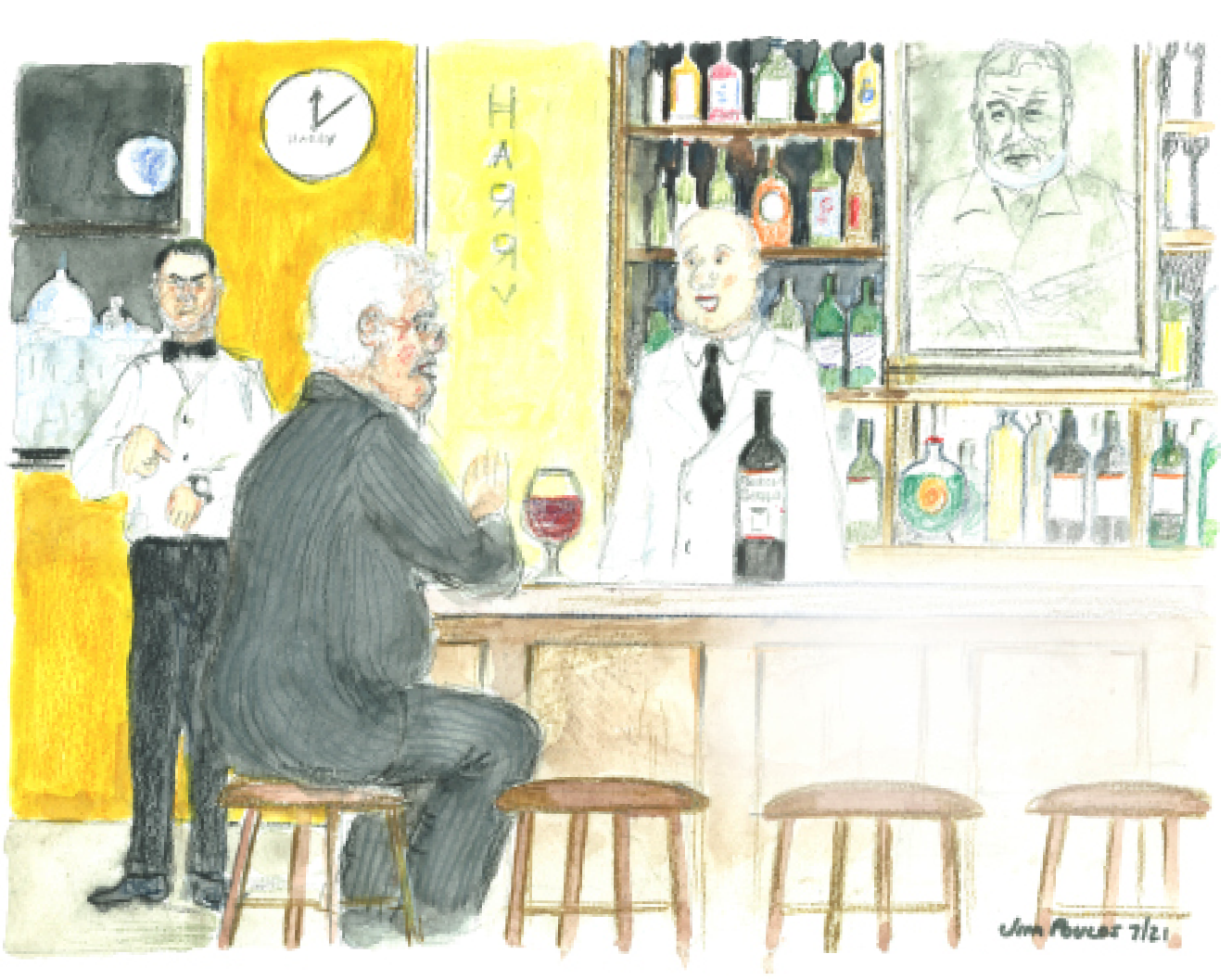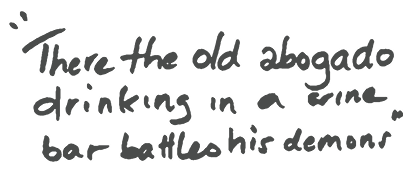Bullfry in a 'clean, well-lighted place'


T he legal representatives and witnesses should ensure that for the duration of the hearing, they utilise a quiet, well-illuminated space ': para [36] of the Protocol for remote hearings (emphasis supplied).
'If I’m out of my mind it’s all right by me', thought Jack Bullfry. 'I wouldn’t be dead for quids'. He was always drawing deep on that well-spring of toploftiness as he meandered up Macquarie Street, even in the depths of a COVID mid-winter. 'Eternity will be an awfully long time, particularly towards the end'. For just that reason he always sought to live sub specie aeternitatis and to abjure the lurking invitation to depression which went under a number of different names: taedium vitae – sloth – accidia – Weltschmerz .
But how to fight that ever present danger off?
The ancients had two simple maxims constantly in mind. First: sufficit diei malitia sua – Sufficient to the day is the evil thereto! Or to put it in Bullfryian terms – don’t sweat the small stuff – and remember, it’s all small stuff. Avoid agonising over submissions for hours on end; make sure that the perfect is not the enemy of the forensically serviceable; get the damn document into the court by electronic filing on time; if you have one perfectly good authority from Sir Owen Dixon set it out, and don’t waste another two hours showing it originated in an obscure dictum of Lord St Leonards.
Secondly, ne quid nimis – Pace yourself! Don’t overdo it! If you have had two glasses of Barolo, savour them, and don’t finish the bottle. If you have put in three hours at the desk, get up and walk twice around Hyde Park. Remember: you can only enjoy the devoted attention of one inamorata at a time, nor do you need more than one residence, or motor car.
But why was the practice of law such a stressful occupation? Luckily, although Bullfry always kept a plentiful supply of Barolo in his armoire, no more dangerous drugs were available on the premises (bearing in mind Rule No 2).
The law is a harsh mistress. It was a wonderful thing to compose men’s quarrels – but Bullfry sadly was not an amiable compositeur ! To the contrary, he was daily engaged in a mano a mano struggle with a doughty opponent whose only aim was to destroy his case. That was the entire problem of practice at the Bar in terms of the stress involved in one short, paradoxical sentence.
Of course, if a matter could be resolved by negotiation it should be – but the only reason for a complex system of legal rules in which an advocate could operate was to have a judicial ruling after full argument and detailed evidence as the ultimate besom. If legal process drifted entirely into a quest for empathy, then the Cadi and his palm-tree beckoned, and there would be no need for argument, or the Bar at all.
Practice at the Bar when the fish are running is unrelenting; there is no end to the amount of labour which can be bestowed on 'working a case up' whether that involved research, preparing a submission, or actually appearing in court. (Even simply listening to cross-examination, crouching like a leopard in the tree about to pounce as soon as an objectionable question was asked, could be exhausting over an entire day.)
And yet, every advocate fears the 'gap' in the diary – there is a constant temptation to 'book up' for months in advance if possible. Bullfry remembered the story Walter Monckton told about Sir John Simon. He was one of the juniors in an international arbitration which had run for 23 consecutive days; the matter concluded at lunchtime and the 'team' approached Sir John with a view to a modest lunch. As they did, they heard him turn to his clerk and say: 'What is the next case, Ronald?'
In every matter a well-trained opponent, well-fortified by solicitorial support, aimed only (within the confines of complex rules) to destroy your case. No question here of a career replete with the spiritual uplift of safely delivering a new baby, to the delight of all; no question of assisting an ageing veteran to spend his last days in comfort and dignity; no question of teaching young children to read or write, or tie their shoelaces. No, only the quotidian cynicism engendered by (usually) a fight about some sum of money or other property – of importance only to the well-funded participants on either side in the barney, to whom sufficient was never enough.
And yet, sadly, in this ultimately fruitless endeavour, no one was indispensable.
'We are very sorry to hear that the Barolo has finally caught up with Mr Bullfry and wish him all the best. Please take the three trolleys in the corner of his room immediately to the Fourth Floor where Ms Blatly’s clerk is waiting for them.'
At the end, when the Vale notice hit In Brief , only two questions:
'Did you hear about Jack? What a way to go! Taken at the flood in the District Court after he was non-suited. When’s the funeral, and who’s getting his room?'
Even if the room was a 'clean and well-lighted' place, recognise that staying immured in a windowless office, under fluorescent lighting, and without company, for 10 hours a day does not conduce to health, either physical or mental.
Bullfry recalled a conference with the top commercial silk many years before. He had reached the leader at 8:30 p.m. to seek his advice on a difficult set-off issue to be pleaded in the Commercial List on the morrow – the chief difficulty being that the basis for the set-off was 'fragile' indeed. His leader greeted him with his usual warmth and immediately offered Bullfry two inches of neat whisky to match his own libation. They turned to the matter in hand and discussed the twists and turns and other ambages of it for half an hour.
At the end, the leader had rasped: 'I’ve been told my doctor to take three laps of Hyde Park every morning; so if there is a difficulty, stand it in the List and I will come up'. But he acted on the medical advice too late; he was struck down in his prime.
Consider the sunk cost of force feeding of the facts down one’s throat, like a foie gras goose, all of which was vital to produce an 'artefact' (to quote Learned Hand J), good for here and now, but ultimately of no consequence at all to anybody. Factor in the sport’s days and school assemblies missed; the parties with old friends foregone; the ageing relatives unvisited.
Spenser’s classic lines on legal conflict came immediately to mind:
Full little knowest thou, that hast not tried,
What hell it is, in suing long to bide:
To loose good dayes that might be better spent;
To waste long nights in pensive discontent.
Bullfry looked again, doubtingly, at the Remote Hearing Protocol. Had its author been channelling an early Hemingway? On one reading it contained a possible felo de se 'trigger', Hemingway’s famous short story, Clean, well-lighted place (1934). There, the old abogado, drinking in a wine bar, battles his demons. He likes the wine bar – just like Chambers it is a 'clean, well-lighted place'! More relevantly, it provides a sanctuary against the nihilism which otherwise assails him on all sides – nada y pues … nada.
The Bar can be a lonely place. Immured in a windowless room for ten hours a day, wading endlessly through papers and submissions. No thought of your fellows and the problems which may beset them. A member of a rapidly ageing cohort whose elastic powers are steadily diminishing.
Seek out a companion; have a temperate lunch ( ne quid nimis ) – recall the morning’s triumph and the days of wine and roses; the advocates who have come and gone; the latest humorous outing in the District Court – keep all in perspective – and remember what isn’t small stuff: keeping healthy and happy; enjoying the company of family and friends; retaining a simple tenacious love of doing a good job.